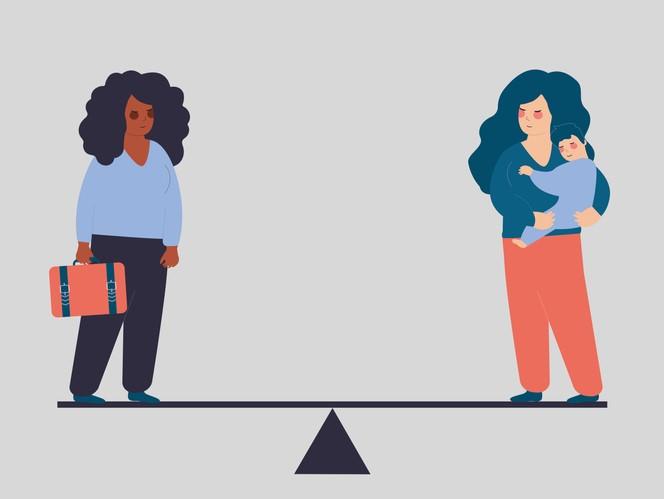
You can have it all, just not all at once

You may also like
To me, the idea that we can have it all at any given moment is a fantasy concocted to make movies and TV shows endlessly aspirational, and real-life humans terminally frustrated. But we can have much of it.
First, just to put it out there: I am in a position of relative privilege to strive for work-life balance now. I have a permanent job, at a relatively senior level, and a loving, supportive partner to boot. But I wasn’t always in this safe position, and I made plenty of sacrifices to get here.
As a junior academic, I made choices to focus on certain things at certain times. Being a first-generation student, migrating to start my academic career, and gay, means I have felt (and still do feel) like I have something to prove. So, I did my best to prove whatever that is to whoever it is. I pushed harder than I thought I could. My health and relationships suffered. Then I got good (enough) at proving things and found myself able to keep them going at a (fairly) decent level with less effort, which now frees up room to focus on hobbies and date nights and such.
- A calendar activity that can help in the battle against burnout
- Using the ‘pick three’ method to avoid burnout in higher education
- In the search for work-life balance, going part-time could provide an answer
Not everyone feels this way, of course. In many institutions, administrative demands increase a lot with seniority, people reinvent their own research profiles (which is fun!) and need to put in a lot of time again and again to their research, and all the while teaching is constantly reinvented (and bureaucratised). But I and several close colleagues, with whom I speak about these issues, agree that we have found a niche that works, out of sheer luck and good choices (and listening to people smarter than us).
Crucially, for me, the big push had an end point. The end point was not “when X happens”, it was an actual date. I planned to push as hard as I could for X number of years, and then I was going to step back and focus on other aspects of my life. I stopped before I had achieved everything, but luckily by then I had built enough momentum to carry me through. The fixed, immovable deadline is important, because we are in a profession where you can always do more/better/keep going, and that’s just not sustainable in my view.
Also, and I cannot stress this enough: institutions and managers play a very significant role here. Institutional demands (even the made-up or pointless ones) can suck all the energy out of you. Speak to your manager about your needs. The worst that will happen is that they will say no to some (or most) of it.
So, where should one focus their energy if deciding to prioritise their career for, say, two or three years? The first thing is to reach out to your loved ones. Tell them what you are setting out to do. Explain that you will be less present for the next few years, and why you are doing it. Ask them for their support, or at least their understanding. You may not get it.
The second step is to make a list of the professional things you want to accomplish in that period. I never wrote the list but wish I had. There is some wriggle room with the list, of course, but I find it useful to have something handy that reminds you of the big picture, of what you are trying to do, so you don’t get swallowed up by the administrative urgency of the job and forget about the important parts of your career that are actually worth the missed date nights and hangouts. Remember: no one gets ahead in an academic career by doing a lot of admin.
If you’re not there yet, try using this targeted push to land that permanent job. To do so, you need to write and publish as much as possible and in targeted ways, which depends on the discipline: in mine, it means journal articles over book chapters, aiming for higher-ranked journals, and pieces that make you intelligible and interesting to a broader subset of academics in your broader field (AKA your hiring committee).
You need to hustle, by which I mean teaching core subjects in your discipline for which there is high demand across departments, reaching out to people who can get you guest lecturer spots in courses and then write you recommendation letters, and finding admin that makes you learn about how an institution works from the inside and helps you find a niche where you can say you will contribute in your job applications.
You should also reach out to everyone you’ve ever met in case they know about a journal special issue, a fancy-sounding guest lecturer gig, a job opening or a grant application team you can join. You also need to find your mentors, those who can guide you through the maze of academic institutional quirks and politics. Having a stronger and market-aware CV, plus mentors who can champion you before hiring committees, goes a long way.
If you’ve landed a permanent job, use your targeted time to consolidate. Go after the big journals in your field – and not just by sending manuscripts. Offer to edit a special issue, which is a great way to build community and connect to people who will then always hold you in high regard for giving them the opportunity to publish in this top journal. Deepen those mentoring relationships. Find your own mentee(s), not only to give back but to create a sense of community with you at the centre. Teach new courses, try new techniques in your teaching. And choose your admin wisely in a way that allows you to display leadership and do cool things with cool people. Crucially, learn to say no.
After these two or three years, step back and assess. No matter whether you’ve accomplished “everything” you set out to do, slow down and focus your energy on the parts of your life you put on pause for this period. You may find that’s hard. The image I use for myself is that of a treadmill: you spent all this time and energy accelerating, and now it’s very hard to slow down. But you need to. Because otherwise you will invariably be launched into a wall (AKA burnout) and, having put less time into your personal life, there will be fewer people there to pick you up.
Doing all these things paid off for me. Of course, they might not pay off in full for everyone, but you will have given it your best, and some growth will certainly come out of it.
Now that I have/am trying to slow down, what do I do to maintain my work-life balance? I try every day. I don’t work weekends or evenings. I say no. I avoid getting too invested in administration. I also stumble and fall on these rules all the time. But I try again next time. I am kind to myself.
Lucas Lixinski is professor in the Faculty of Law and Justice, UNSW Sydney, Australia.
If you would like advice and insight from academics and university staff delivered direct to your inbox each week, sign up for the Campus newsletter.


